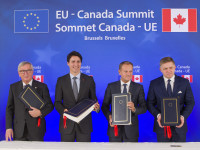The Canadian government moved quickly from signing the trade agreement between Canada and the European Union on Sunday to tabling Bill C-30, the CETA implementing legislation, on Monday. While most of the attention has focused on the political issues surrounding CETA in Europe and the potential gains for Canadian exporters due to tariff reductions, the implementing bill provides a reminder that there are significant costs associated with CETA that have generated far less discussion. In fact, the majority of the 140-page bill features changes to Canada’s intellectual property rules, requiring changes that largely serve European interests.
Mandated reforms to patent protections (in the form of term restoration provisions) and the expansion of protections for dozens of European geographical indications was always part of the price to be paid for CETA. There were concerns expressed throughout the negotiations on both issues. Geographic indications rules grant protections to foods widely produced around the world and establish new marketing and naming restrictions on Canadian food producers. Meanwhile, the patent term restoration provisions are likely to increase health care costs in Canada by delaying the availability of generic pharmaceuticals due to the extension in the term of protection for patented pharmaceuticals.







